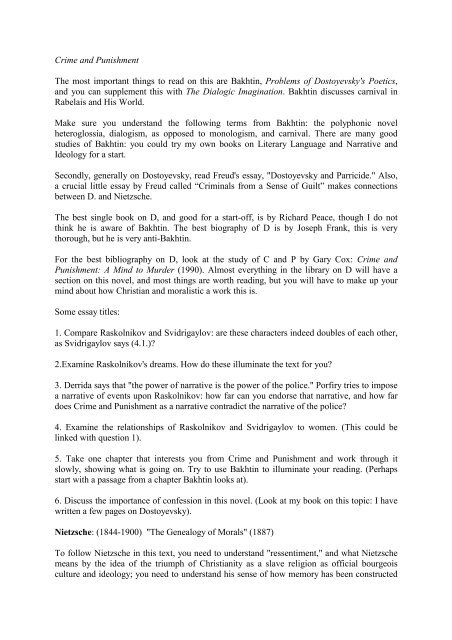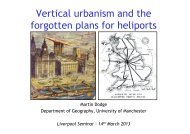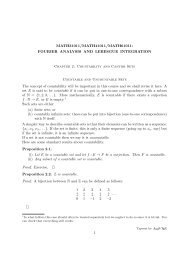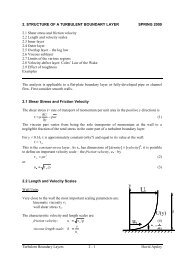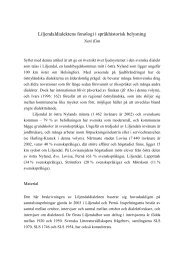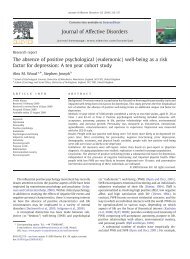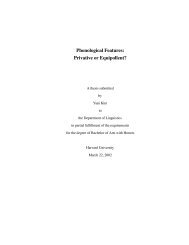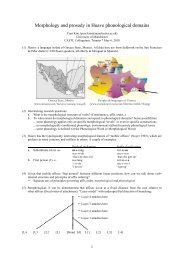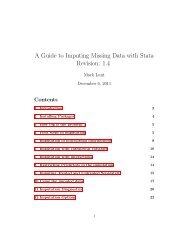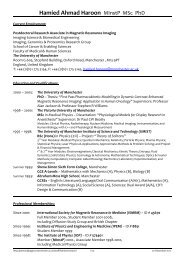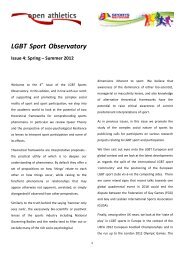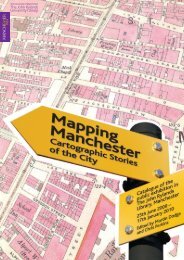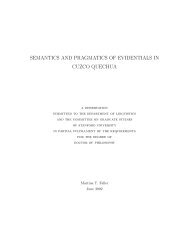Crime and Punishment The most important things to read on this are ...
Crime and Punishment The most important things to read on this are ...
Crime and Punishment The most important things to read on this are ...
You also want an ePaper? Increase the reach of your titles
YUMPU automatically turns print PDFs into web optimized ePapers that Google loves.
<str<strong>on</strong>g>Crime</str<strong>on</strong>g> <str<strong>on</strong>g>and</str<strong>on</strong>g> <str<strong>on</strong>g>Punishment</str<strong>on</strong>g><br />
<str<strong>on</strong>g>The</str<strong>on</strong>g> <str<strong>on</strong>g>most</str<strong>on</strong>g> <str<strong>on</strong>g>important</str<strong>on</strong>g> <str<strong>on</strong>g>things</str<strong>on</strong>g> <str<strong>on</strong>g>to</str<strong>on</strong>g> <str<strong>on</strong>g>read</str<strong>on</strong>g> <strong>on</strong> <strong>this</strong> <strong>are</strong> Bakhtin, Problems of Dos<str<strong>on</strong>g>to</str<strong>on</strong>g>yevsky's Poetics,<br />
<str<strong>on</strong>g>and</str<strong>on</strong>g> you can supplement <strong>this</strong> with <str<strong>on</strong>g>The</str<strong>on</strong>g> Dialogic Imaginati<strong>on</strong>. Bakhtin discusses carnival in<br />
Rabelais <str<strong>on</strong>g>and</str<strong>on</strong>g> His World.<br />
Make sure you underst<str<strong>on</strong>g>and</str<strong>on</strong>g> the following terms from Bakhtin: the polyph<strong>on</strong>ic novel<br />
heteroglossia, dialogism, as opposed <str<strong>on</strong>g>to</str<strong>on</strong>g> m<strong>on</strong>ologism, <str<strong>on</strong>g>and</str<strong>on</strong>g> carnival. <str<strong>on</strong>g>The</str<strong>on</strong>g>re <strong>are</strong> many good<br />
studies of Bakhtin: you could try my own books <strong>on</strong> Literary Language <str<strong>on</strong>g>and</str<strong>on</strong>g> Narrative <str<strong>on</strong>g>and</str<strong>on</strong>g><br />
Ideology for a start.<br />
Sec<strong>on</strong>dly, generally <strong>on</strong> Dos<str<strong>on</strong>g>to</str<strong>on</strong>g>yevsky, <str<strong>on</strong>g>read</str<strong>on</strong>g> Freud's essay, "Dos<str<strong>on</strong>g>to</str<strong>on</strong>g>yevsky <str<strong>on</strong>g>and</str<strong>on</strong>g> Parricide." Also,<br />
a crucial little essay by Freud called “Criminals from a Sense of Guilt” makes c<strong>on</strong>necti<strong>on</strong>s<br />
between D. <str<strong>on</strong>g>and</str<strong>on</strong>g> Nietzsche.<br />
<str<strong>on</strong>g>The</str<strong>on</strong>g> best single book <strong>on</strong> D, <str<strong>on</strong>g>and</str<strong>on</strong>g> good for a start-off, is by Richard Peace, though I do not<br />
think he is aw<strong>are</strong> of Bakhtin. <str<strong>on</strong>g>The</str<strong>on</strong>g> best biography of D is by Joseph Frank, <strong>this</strong> is very<br />
thorough, but he is very anti-Bakhtin.<br />
For the best bibliography <strong>on</strong> D, look at the study of C <str<strong>on</strong>g>and</str<strong>on</strong>g> P by Gary Cox: <str<strong>on</strong>g>Crime</str<strong>on</strong>g> <str<strong>on</strong>g>and</str<strong>on</strong>g><br />
<str<strong>on</strong>g>Punishment</str<strong>on</strong>g>: A Mind <str<strong>on</strong>g>to</str<strong>on</strong>g> Murder (1990). Al<str<strong>on</strong>g>most</str<strong>on</strong>g> everything in the library <strong>on</strong> D will have a<br />
secti<strong>on</strong> <strong>on</strong> <strong>this</strong> novel, <str<strong>on</strong>g>and</str<strong>on</strong>g> <str<strong>on</strong>g>most</str<strong>on</strong>g> <str<strong>on</strong>g>things</str<strong>on</strong>g> <strong>are</strong> worth <str<strong>on</strong>g>read</str<strong>on</strong>g>ing, but you will have <str<strong>on</strong>g>to</str<strong>on</strong>g> make up your<br />
mind about how Christian <str<strong>on</strong>g>and</str<strong>on</strong>g> moralistic a work <strong>this</strong> is.<br />
Some essay titles:<br />
1. Comp<strong>are</strong> Raskolnikov <str<strong>on</strong>g>and</str<strong>on</strong>g> Svidrigaylov: <strong>are</strong> these characters indeed doubles of each other,<br />
as Svidrigaylov says (4.1.)?<br />
2.Examine Raskolnikov's dreams. How do these illuminate the text for you?<br />
3. Derrida says that "the power of narrative is the power of the police." Porfiry tries <str<strong>on</strong>g>to</str<strong>on</strong>g> impose<br />
a narrative of events up<strong>on</strong> Raskolnikov: how far can you endorse that narrative, <str<strong>on</strong>g>and</str<strong>on</strong>g> how far<br />
does <str<strong>on</strong>g>Crime</str<strong>on</strong>g> <str<strong>on</strong>g>and</str<strong>on</strong>g> <str<strong>on</strong>g>Punishment</str<strong>on</strong>g> as a narrative c<strong>on</strong>tradict the narrative of the police?<br />
4. Examine the relati<strong>on</strong>ships of Raskolnikov <str<strong>on</strong>g>and</str<strong>on</strong>g> Svidrigaylov <str<strong>on</strong>g>to</str<strong>on</strong>g> women. (This could be<br />
linked with questi<strong>on</strong> 1).<br />
5. Take <strong>on</strong>e chapter that interests you from <str<strong>on</strong>g>Crime</str<strong>on</strong>g> <str<strong>on</strong>g>and</str<strong>on</strong>g> <str<strong>on</strong>g>Punishment</str<strong>on</strong>g> <str<strong>on</strong>g>and</str<strong>on</strong>g> work through it<br />
slowly, showing what is going <strong>on</strong>. Try <str<strong>on</strong>g>to</str<strong>on</strong>g> use Bakhtin <str<strong>on</strong>g>to</str<strong>on</strong>g> illuminate your <str<strong>on</strong>g>read</str<strong>on</strong>g>ing. (Perhaps<br />
start with a passage from a chapter Bakhtin looks at).<br />
6. Discuss the importance of c<strong>on</strong>fessi<strong>on</strong> in <strong>this</strong> novel. (Look at my book <strong>on</strong> <strong>this</strong> <str<strong>on</strong>g>to</str<strong>on</strong>g>pic: I have<br />
written a few pages <strong>on</strong> Dos<str<strong>on</strong>g>to</str<strong>on</strong>g>yevsky).<br />
Nietzsche: (1844-1900) "<str<strong>on</strong>g>The</str<strong>on</strong>g> Genealogy of Morals" (1887)<br />
To follow Nietzsche in <strong>this</strong> text, you need <str<strong>on</strong>g>to</str<strong>on</strong>g> underst<str<strong>on</strong>g>and</str<strong>on</strong>g> "ressentiment," <str<strong>on</strong>g>and</str<strong>on</strong>g> what Nietzsche<br />
means by the idea of the triumph of Christianity as a slave religi<strong>on</strong> as official bourgeois<br />
culture <str<strong>on</strong>g>and</str<strong>on</strong>g> ideology; you need <str<strong>on</strong>g>to</str<strong>on</strong>g> underst<str<strong>on</strong>g>and</str<strong>on</strong>g> his sense of how memory has been c<strong>on</strong>structed
<str<strong>on</strong>g>to</str<strong>on</strong>g> make the subject aw<strong>are</strong> <str<strong>on</strong>g>and</str<strong>on</strong>g> resp<strong>on</strong>sible, <str<strong>on</strong>g>and</str<strong>on</strong>g> feeling guilty, <str<strong>on</strong>g>and</str<strong>on</strong>g> you need <str<strong>on</strong>g>to</str<strong>on</strong>g> underst<str<strong>on</strong>g>and</str<strong>on</strong>g> the<br />
ascetic ideal. Any book that helps you <strong>on</strong> these will be valuable. Books I like <strong>on</strong> Nietzsche<br />
include:<br />
Alan White, Within Nietzsche's Labyrinth 1990<br />
Gilles Deleuze, Nietzsche <str<strong>on</strong>g>and</str<strong>on</strong>g> Philosophy, 1983<br />
Jacques Derrida, Spurs, 1972<br />
Tracy B Str<strong>on</strong>g, Friedrich Nietzsche <str<strong>on</strong>g>and</str<strong>on</strong>g> the Politics of Transfigurati<strong>on</strong> 1988<br />
See also my book <strong>on</strong> C<strong>on</strong>fessi<strong>on</strong>, <str<strong>on</strong>g>and</str<strong>on</strong>g> Opera <str<strong>on</strong>g>and</str<strong>on</strong>g> the Culture of Fascism, both of which have<br />
much <str<strong>on</strong>g>to</str<strong>on</strong>g> say about ressentiment <str<strong>on</strong>g>and</str<strong>on</strong>g> "<str<strong>on</strong>g>The</str<strong>on</strong>g> Genealogy of Morals."<br />
<str<strong>on</strong>g>The</str<strong>on</strong>g>re is much else written <strong>on</strong> Nietzsche, of very varied quality. <str<strong>on</strong>g>The</str<strong>on</strong>g> comparis<strong>on</strong>s with<br />
Dos<str<strong>on</strong>g>to</str<strong>on</strong>g>yevsky <strong>are</strong> <str<strong>on</strong>g>important</str<strong>on</strong>g>: N. <str<strong>on</strong>g>read</str<strong>on</strong>g> D <str<strong>on</strong>g>and</str<strong>on</strong>g> commented <strong>on</strong> him enthusiastically, as he also<br />
liked "Carmen" very much. Use N. <str<strong>on</strong>g>to</str<strong>on</strong>g> <str<strong>on</strong>g>read</str<strong>on</strong>g> Dos<str<strong>on</strong>g>to</str<strong>on</strong>g>yevsky, but also use N <str<strong>on</strong>g>to</str<strong>on</strong>g> see how his ideas<br />
illuminate the whole idea of reacti<strong>on</strong>. A good essay <strong>on</strong> "<str<strong>on</strong>g>The</str<strong>on</strong>g> Genealogy of Morals" would ask<br />
how the three essays link <str<strong>on</strong>g>to</str<strong>on</strong>g> each other: what is the logic that ties them all <str<strong>on</strong>g>to</str<strong>on</strong>g>gether.<br />
Rimbaud<br />
1854-91<br />
<str<strong>on</strong>g>The</str<strong>on</strong>g> basic dates <str<strong>on</strong>g>to</str<strong>on</strong>g> remember <strong>are</strong>: 1. his meeting with Verlaine in September 1871 &emdash;<br />
in the year of the Paris Commune (18 March &emdash; 28 May). 25,000 died in the fighting<br />
in Paris in the last week of May. 2. His experiences with Verlaine in Paris <str<strong>on</strong>g>and</str<strong>on</strong>g> L<strong>on</strong>d<strong>on</strong> in<br />
1872, culminating with Verlaine shooting him in July 1873. That summer, he finished<br />
"Seas<strong>on</strong> in Hell." Rimbaud c<strong>on</strong>tinued writing, however, the poems called "Illuminati<strong>on</strong>s."<br />
Essay questi<strong>on</strong>:<br />
Rimbaud's "Seas<strong>on</strong> in Hell" is often regarded as his f<strong>are</strong>well <str<strong>on</strong>g>to</str<strong>on</strong>g> literature. Why did Rimbaud<br />
feel that he wanted <str<strong>on</strong>g>to</str<strong>on</strong>g> say goodbye <str<strong>on</strong>g>to</str<strong>on</strong>g> literature &emdash; identifying <strong>this</strong> with bourgeois<br />
culture?<br />
"I is some<strong>on</strong>e else" note the importance of the other pers<strong>on</strong> who speaks in the "Delirium"<br />
poems.<br />
A good essay questi<strong>on</strong> would be <str<strong>on</strong>g>to</str<strong>on</strong>g> explore the noti<strong>on</strong> "Je est un autre."<br />
<str<strong>on</strong>g>The</str<strong>on</strong>g>re is plenty of material <strong>on</strong> Rimbaud, not all of it easy, however, <str<strong>on</strong>g>and</str<strong>on</strong>g> you will have <str<strong>on</strong>g>to</str<strong>on</strong>g><br />
persevere with the French.<br />
James Lawler: Rimbaud's theatre of the Self 1992<br />
Nathaniel Wing: <str<strong>on</strong>g>The</str<strong>on</strong>g> Limits of Narrative 1986<br />
Dee Reynolds, Symbolist Aesthetics <str<strong>on</strong>g>and</str<strong>on</strong>g> Early Abstract Art 1995<br />
Kirsten Ross, Rimbaud <str<strong>on</strong>g>and</str<strong>on</strong>g> the Paris Commune, 1988<br />
Svetlana Boym, Death in Quotati<strong>on</strong> Marks 1991<br />
You should try the following ideas:<br />
Links between Rimbaud's sense of being cursed (maudit) with the sense of being Bohemian<br />
<str<strong>on</strong>g>and</str<strong>on</strong>g> being like Raskolnikov, thinking of being a great criminal.
What does Rimbaud <str<strong>on</strong>g>most</str<strong>on</strong>g> dislike in c<strong>on</strong>temporary bourgeois culture? (Beauty, women, talk<br />
of degenerati<strong>on</strong> &emdash; cp. the criminal, who was thought of then as criminal because he<br />
was degenerate; the homosexual <str<strong>on</strong>g>and</str<strong>on</strong>g> the col<strong>on</strong>ial other, or subject.)<br />
How would you comp<strong>are</strong> Rimbaud's critique of his age with Nietzsche's?<br />
What is new in Rimbaud's poetry? How would you begin <str<strong>on</strong>g>to</str<strong>on</strong>g> comp<strong>are</strong> it with Emily<br />
Dickins<strong>on</strong>'s?<br />
Emily Dickins<strong>on</strong><br />
Born, 1830 at Amherst, Massachusetts; the oldest <str<strong>on</strong>g>and</str<strong>on</strong>g> <str<strong>on</strong>g>most</str<strong>on</strong>g> traditi<strong>on</strong>al part for settlement in<br />
America, called "New Engl<str<strong>on</strong>g>and</str<strong>on</strong>g>." Most wrapped up in the past, <str<strong>on</strong>g>and</str<strong>on</strong>g> in Christianity, <str<strong>on</strong>g>most</str<strong>on</strong>g><br />
remote from black culture.<br />
In 1855, the family moved <str<strong>on</strong>g>to</str<strong>on</strong>g> the house that she lived in till her death in 1886. Her brother,<br />
Austin, married Susan Gilbert in 1856. <str<strong>on</strong>g>The</str<strong>on</strong>g> wife was ED's <str<strong>on</strong>g>most</str<strong>on</strong>g> valued female friend, <str<strong>on</strong>g>and</str<strong>on</strong>g> the<br />
emoti<strong>on</strong>al intensity has often prompted discussi<strong>on</strong> of lesbianism in Dickins<strong>on</strong>'s work.<br />
In 1858 <str<strong>on</strong>g>and</str<strong>on</strong>g> 1861, ED drafted letters <str<strong>on</strong>g>to</str<strong>on</strong>g> a mysterious "Master" who has not been identified,<br />
<str<strong>on</strong>g>and</str<strong>on</strong>g> in 1861, seems <str<strong>on</strong>g>to</str<strong>on</strong>g> have had a crisis-year. From <strong>this</strong> time <strong>on</strong>, she became more <str<strong>on</strong>g>and</str<strong>on</strong>g> more<br />
reclusive, <str<strong>on</strong>g>and</str<strong>on</strong>g> dressed in white:<br />
- the colour of virginity, of purity<br />
- of Miss Havisham, in Dickens’s Great Expectati<strong>on</strong>s<br />
- the crisis-colour for America, since 1861-5 saw the Civil War <str<strong>on</strong>g>and</str<strong>on</strong>g> the questi<strong>on</strong> of the black<br />
as an issue that would not go away. White is therefore the colour of obsessi<strong>on</strong>, or of<br />
pathology: if she dressed in white, that might suggest that she was recognising, or resp<strong>on</strong>ding<br />
<str<strong>on</strong>g>to</str<strong>on</strong>g> a sickness in America; which affected American women, <str<strong>on</strong>g>and</str<strong>on</strong>g> also denied their desire.<br />
- the colour of snow, of paper that has not been printed <strong>on</strong> (see the poem "Publicati<strong>on</strong> is the<br />
aucti<strong>on</strong>" no. 709. Dickins<strong>on</strong> wants her work <str<strong>on</strong>g>to</str<strong>on</strong>g> remain like white paper.<br />
On Dickins<strong>on</strong>, you should <str<strong>on</strong>g>read</str<strong>on</strong>g>:<br />
S<str<strong>on</strong>g>and</str<strong>on</strong>g>ra Gilbert <str<strong>on</strong>g>and</str<strong>on</strong>g> Susan Gubar, <str<strong>on</strong>g>The</str<strong>on</strong>g> Madwoman in the Attic, 1979<br />
John Cody, After Great Pain, 1971<br />
Robert Weisbuch, Emily Dickins<strong>on</strong>'s Poetry, 1975<br />
Paula Bennett, Emily Dickins<strong>on</strong>, Woman Poet, 1991<br />
Martha Nell Smith, Rowing in Eden: Re-<str<strong>on</strong>g>read</str<strong>on</strong>g>ing Emily Dickins<strong>on</strong><br />
(there is a large sec<strong>on</strong>dary literature <strong>on</strong> Dickins<strong>on</strong>. For the idea of the hymen, see the essay<br />
by Geoffrey Hartman in "Criticism in the Wilderness," 1980.<br />
For a Bibliography, see Judith Farr, ed. "Emily Dickins<strong>on</strong>: A Collecti<strong>on</strong> of Critical Essays"<br />
1996.<br />
Note what there is not in ED's poetry:<br />
No his<str<strong>on</strong>g>to</str<strong>on</strong>g>ry in the poems<br />
No his<str<strong>on</strong>g>to</str<strong>on</strong>g>ry <str<strong>on</strong>g>to</str<strong>on</strong>g> be worked out from the poems: they seem <str<strong>on</strong>g>to</str<strong>on</strong>g> have no his<str<strong>on</strong>g>to</str<strong>on</strong>g>ry<br />
No identifiable speaker.<br />
No ranking, no selecti<strong>on</strong>, or ordering of the poems<br />
No study of how <str<strong>on</strong>g>to</str<strong>on</strong>g> write, or comments <strong>on</strong> what she writes<br />
No plot <str<strong>on</strong>g>to</str<strong>on</strong>g> the poems overall<br />
No titles<br />
No punctuati<strong>on</strong>.
In a letter, ED said, "When I state myself, as the representative in the verse [that is, when the<br />
word "I" appears], it does not mean me, but a supposed pers<strong>on</strong>."<br />
Essay title:<br />
Emily Dickins<strong>on</strong>'s poetry seems <str<strong>on</strong>g>to</str<strong>on</strong>g> work by negatives. What have you found in the poetry <str<strong>on</strong>g>to</str<strong>on</strong>g><br />
challenge you?<br />
You may find it helpful <str<strong>on</strong>g>to</str<strong>on</strong>g> comp<strong>are</strong> ED with Charlotte Perkins Gilman, <str<strong>on</strong>g>and</str<strong>on</strong>g> with the<br />
Bibliography <strong>on</strong> her.<br />
<str<strong>on</strong>g>The</str<strong>on</strong>g> Yellow Wallpaper (1892)<br />
(Charlotte Perkins Gilman)<br />
Some <str<strong>on</strong>g>read</str<strong>on</strong>g>ing suggesti<strong>on</strong>s for those interested in working further, or in writing, <strong>on</strong> <strong>this</strong> text.:<br />
Ellen Moers, Literary Women 1977<br />
Shari Bens<str<strong>on</strong>g>to</str<strong>on</strong>g>ck (ed.) Feminist Issues in Literary Scholarship<br />
Michelle A Massé In the Name of Love: Women, Masochism <str<strong>on</strong>g>and</str<strong>on</strong>g> the Gothic 1992<br />
Diana Price Herndl, Invalid Women: Figuring Feminine Illness in American Ficti<strong>on</strong> <str<strong>on</strong>g>and</str<strong>on</strong>g><br />
Culture , 1840-1900 , 1993<br />
Annette Kolodny, "A Map for Mis<str<strong>on</strong>g>read</str<strong>on</strong>g>ing," New Literary His<str<strong>on</strong>g>to</str<strong>on</strong>g>ry 11, 1980,<br />
451-67.<br />
Susan S. Lanser, "Feminist Criticism, "<str<strong>on</strong>g>The</str<strong>on</strong>g> Yellow Wallpaper" <str<strong>on</strong>g>and</str<strong>on</strong>g> the Politics of Color in<br />
America" Feminist Studies 15.3. 1989, 415-41.<br />
Novels behind <str<strong>on</strong>g>The</str<strong>on</strong>g> Yellow Wallpaper:<br />
Charlotte Br<strong>on</strong>te: Jane Eyre (1847) <str<strong>on</strong>g>and</str<strong>on</strong>g> Villette (1853); Jane Austen, Mansfield Park (1816)<br />
Kate Chopin, <str<strong>on</strong>g>The</str<strong>on</strong>g> Awakening (1895) develops closely from Gilman's novella.<br />
On the Gothic theme in nineteenth-century ficti<strong>on</strong>:<br />
S<str<strong>on</strong>g>and</str<strong>on</strong>g>ra Gilbert <str<strong>on</strong>g>and</str<strong>on</strong>g> Susan Gubar: <str<strong>on</strong>g>The</str<strong>on</strong>g> Madwoman in the Attic 1979<br />
Juliann Fleenor, (ed.) <str<strong>on</strong>g>The</str<strong>on</strong>g> Female Gothic 1983<br />
On ecriture feminine, see Ann Rosl<str<strong>on</strong>g>and</str<strong>on</strong>g> J<strong>on</strong>es, "Writing the Body: Towards an underst<str<strong>on</strong>g>and</str<strong>on</strong>g>ing<br />
of l'ecriture feminine," in Elaine Showalter (ed.) <str<strong>on</strong>g>The</str<strong>on</strong>g> New Feminist Criticism, 1986 (an<br />
ultimately hostile view of Helen Cixous, Luce Irigaray <str<strong>on</strong>g>and</str<strong>on</strong>g> Julia Kristeva, whose writings<br />
may be found, initially, in <str<strong>on</strong>g>The</str<strong>on</strong>g> New French Feminisms ed. Elaine Marks <str<strong>on</strong>g>and</str<strong>on</strong>g> Isablle de<br />
Courtivr<strong>on</strong>, (1986).<br />
On feminist criticism, see:<br />
Toril Moi, Sexual / Textual Politics 1985<br />
Pam Morris, Literature <str<strong>on</strong>g>and</str<strong>on</strong>g> Feminism 1994<br />
Gayle Greene <str<strong>on</strong>g>and</str<strong>on</strong>g> Coppelia Kahn, Making A Difference: Feminist Literary Criticism 1985<br />
You should also look up Gilman <strong>on</strong> the subject catalogue <strong>on</strong> the library computer, <str<strong>on</strong>g>and</str<strong>on</strong>g> for<br />
more detailed work, look at the entry <strong>on</strong> mental illness <str<strong>on</strong>g>and</str<strong>on</strong>g> literature. For psychoanalysis, the
volume by Freud <str<strong>on</strong>g>and</str<strong>on</strong>g> Breuer, Studies <strong>on</strong> Hysteria (1895) is <str<strong>on</strong>g>important</str<strong>on</strong>g> background <str<strong>on</strong>g>read</str<strong>on</strong>g>ing: I<br />
hesitate <str<strong>on</strong>g>to</str<strong>on</strong>g> recommend anything by Lacan, but his work provides an essential c<strong>on</strong>text.<br />
<str<strong>on</strong>g>The</str<strong>on</strong>g> Turn of the Screw<br />
Henry James's short s<str<strong>on</strong>g>to</str<strong>on</strong>g>ry (call it a novella) was first published as a serial in a magazine in<br />
1898 <str<strong>on</strong>g>and</str<strong>on</strong>g> then issued in book-form. It was revised ten years later for Henry James's definitive<br />
editi<strong>on</strong> of his books, <str<strong>on</strong>g>The</str<strong>on</strong>g> New York editi<strong>on</strong>, with a Preface added. <str<strong>on</strong>g>The</str<strong>on</strong>g> Nor<str<strong>on</strong>g>to</str<strong>on</strong>g>n Critical<br />
Editi<strong>on</strong> of the novella prints it <str<strong>on</strong>g>to</str<strong>on</strong>g>gether with some older criticism; but good modern criticism<br />
of it includes<br />
Shoshana Felman, in Writing <str<strong>on</strong>g>and</str<strong>on</strong>g> Madness 1985. This essay first appe<strong>are</strong>d in 1982 in the<br />
journal Yale French Studies.<br />
Ned Lukacher, Primal Scenes<br />
Peter G Beidler, - anthology of criticism of the text. 1995. This reprints <strong>on</strong>ly part of Felman's<br />
essay.<br />
Terry Heller, <str<strong>on</strong>g>The</str<strong>on</strong>g> Turn of the Screw: Bewildered Visi<strong>on</strong> 1989<br />
T.J. Lustig, Henry James <str<strong>on</strong>g>and</str<strong>on</strong>g> the Ghostly 1994. See Bibliography.<br />
Jeremy Tambling: Henry Jmaes: Critical Issues 2000<br />
For a comparis<strong>on</strong> with Freud <strong>on</strong> hysteria, <str<strong>on</strong>g>and</str<strong>on</strong>g> Freud's treatment of "Dora," <strong>on</strong>e of the famous<br />
analyses of Freud, which has been much commented <strong>on</strong>, see Paula Marantz Cohen, essay in<br />
the journal Criticism 28, 1986, 73-87.<br />
On Alice James <str<strong>on</strong>g>and</str<strong>on</strong>g> the hysteria in <str<strong>on</strong>g>The</str<strong>on</strong>g> Turn of the Screw see Oscar Cargill, in Kimbaugh's<br />
Nor<str<strong>on</strong>g>to</str<strong>on</strong>g>n editi<strong>on</strong>. Cargill also suggested that Freud <str<strong>on</strong>g>and</str<strong>on</strong>g> Brauer's "Studies <strong>on</strong> Hysteria"<br />
influenced James.<br />
On Alice James, her Diaries, <str<strong>on</strong>g>and</str<strong>on</strong>g> her letters <strong>are</strong> both available in the library; so <strong>are</strong><br />
biographies of the James family; including William James (philosopher, psychologist), <str<strong>on</strong>g>and</str<strong>on</strong>g><br />
Henry James. See the biographies by R.W. B. Lewis, by F.O. Matthiessen <str<strong>on</strong>g>and</str<strong>on</strong>g> of James'<br />
father, by Alfred Habegger.<br />
On hysteria in the 19th century, see Elaine Showalter, <str<strong>on</strong>g>The</str<strong>on</strong>g> Female malady; 1985; <str<strong>on</strong>g>and</str<strong>on</strong>g> her<br />
essay in S<str<strong>on</strong>g>and</str<strong>on</strong>g>er L. Gilman (ed.) Hysteria Bey<strong>on</strong>d Freud. <str<strong>on</strong>g>The</str<strong>on</strong>g> material <strong>on</strong> 19th century<br />
hysteria is vast: see my notes <strong>on</strong> Emily Dickins<strong>on</strong>.<br />
Other places where you might look for material <strong>on</strong> <str<strong>on</strong>g>The</str<strong>on</strong>g> Turn of the Screw would be American<br />
Literature <str<strong>on</strong>g>and</str<strong>on</strong>g> Nineteenth Century Literature. <str<strong>on</strong>g>The</str<strong>on</strong>g>se <strong>are</strong> solid journals. <str<strong>on</strong>g>The</str<strong>on</strong>g>re is much other<br />
material <strong>on</strong> James in the American literature secti<strong>on</strong>, <str<strong>on</strong>g>and</str<strong>on</strong>g> you should look at <strong>this</strong>.<br />
<str<strong>on</strong>g>The</str<strong>on</strong>g> best idea for an essay would be <str<strong>on</strong>g>to</str<strong>on</strong>g> ask whether you think the ghosts <strong>are</strong> "real" or a feature<br />
of the governess's hysterical imaginati<strong>on</strong>. <str<strong>on</strong>g>The</str<strong>on</strong>g> view that they <strong>are</strong> not real was first out<br />
forward by Edmund Wils<strong>on</strong> in an essay called "<str<strong>on</strong>g>The</str<strong>on</strong>g> Ambiguity of Henry James" , <str<strong>on</strong>g>The</str<strong>on</strong>g> Triple<br />
Thinkers.<br />
D<strong>on</strong>'t forget the frame-narrative: the questi<strong>on</strong> why the s<str<strong>on</strong>g>to</str<strong>on</strong>g>ry is <str<strong>on</strong>g>to</str<strong>on</strong>g>ld by Douglas. This could<br />
make a good basis for an essay. <str<strong>on</strong>g>The</str<strong>on</strong>g> novella is basically au<str<strong>on</strong>g>to</str<strong>on</strong>g>biographical in form, but does<br />
the governess think of herself as anything but absolutely normal? Are the children normal?<br />
D<strong>on</strong>'t forget the comparis<strong>on</strong> with Jane Eyre <str<strong>on</strong>g>and</str<strong>on</strong>g> the "madwoman in the attic."
You could try a comparis<strong>on</strong> between the issues of <str<strong>on</strong>g>The</str<strong>on</strong>g> Turn of the Screw <str<strong>on</strong>g>and</str<strong>on</strong>g> what Emily<br />
Dickins<strong>on</strong> writes about: <strong>this</strong> would be very interesting. Other comparis<strong>on</strong>s <str<strong>on</strong>g>to</str<strong>on</strong>g> be made would<br />
be with Raskolnikov's state of mind; <str<strong>on</strong>g>and</str<strong>on</strong>g> you could think about the text as modernist, in that<br />
it refuses <str<strong>on</strong>g>to</str<strong>on</strong>g> be interpreted: it is not clear what has happened in the text, <str<strong>on</strong>g>and</str<strong>on</strong>g> any attempt <str<strong>on</strong>g>to</str<strong>on</strong>g><br />
pin it down turns out <str<strong>on</strong>g>to</str<strong>on</strong>g> be impossible. In what ways is <str<strong>on</strong>g>The</str<strong>on</strong>g> Turn of the Screw a modernist<br />
work? Or a feminist text? Or a text simply trying <str<strong>on</strong>g>to</str<strong>on</strong>g> cause a thrill? Or a text about the<br />
corrupti<strong>on</strong> of children?<br />
Death in Venice<br />
We will look at <strong>this</strong> text via the film made by Luchino Visc<strong>on</strong>ti in 1971, starring Dirk<br />
Bogarde, <str<strong>on</strong>g>and</str<strong>on</strong>g> with music from his 3rd <str<strong>on</strong>g>and</str<strong>on</strong>g> 5th Symph<strong>on</strong>ies by Gustav Mahler. I recommend<br />
that you also try <str<strong>on</strong>g>to</str<strong>on</strong>g> <str<strong>on</strong>g>read</str<strong>on</strong>g> the novella by Thomas Mann (1875-1955).<br />
<str<strong>on</strong>g>The</str<strong>on</strong>g> difference in the film is that Aschenbach is made not a writer, as he is in the novella, but<br />
a musician &emdash;specifically the Jewish composer of symph<strong>on</strong>ies, who lived in Vienna,<br />
Mahler (1860-1911). Much of the extra dialogue that the film puts in comes from Thomas<br />
Mann's later novel, Doc<str<strong>on</strong>g>to</str<strong>on</strong>g>r Faustus, which is about an imaginary musician, partly based <strong>on</strong><br />
Nietzsche, <str<strong>on</strong>g>and</str<strong>on</strong>g> partly <strong>on</strong> Arnold Schoenberg, the Modernist composer. Schoenberg believed<br />
that music should be a <str<strong>on</strong>g>to</str<strong>on</strong>g>tally intellectual structure, <str<strong>on</strong>g>and</str<strong>on</strong>g> devised a highly objective system of<br />
writing, called the twelve <str<strong>on</strong>g>to</str<strong>on</strong>g>ne method, in order <str<strong>on</strong>g>to</str<strong>on</strong>g> present it. <str<strong>on</strong>g>The</str<strong>on</strong>g> film shows arguments<br />
between Aschenbach <str<strong>on</strong>g>and</str<strong>on</strong>g> another musician who is supposed <str<strong>on</strong>g>to</str<strong>on</strong>g> be Schoenberg, but the<br />
arguments <strong>are</strong> very difficult <str<strong>on</strong>g>to</str<strong>on</strong>g> follow. Basically, in <strong>this</strong> film, A., who goes <str<strong>on</strong>g>to</str<strong>on</strong>g> Venice <str<strong>on</strong>g>to</str<strong>on</strong>g><br />
recuperate from a nervous breakdown, <str<strong>on</strong>g>and</str<strong>on</strong>g> there falls in love with the Polish boy Tadzio, has<br />
tried <str<strong>on</strong>g>to</str<strong>on</strong>g> write music that denies the emoti<strong>on</strong>s, <str<strong>on</strong>g>and</str<strong>on</strong>g> that is anti-sensual, because music<br />
&emdash; such is the power of the devil in it; leads you back <str<strong>on</strong>g>to</str<strong>on</strong>g> sexuality, <str<strong>on</strong>g>to</str<strong>on</strong>g> the body, not<br />
<str<strong>on</strong>g>to</str<strong>on</strong>g>wards some kind of higher sphere. A. is shocked <str<strong>on</strong>g>to</str<strong>on</strong>g> discover that when he is in Venice, his<br />
emoti<strong>on</strong>s <strong>are</strong> released, <str<strong>on</strong>g>and</str<strong>on</strong>g> that they turn out <str<strong>on</strong>g>to</str<strong>on</strong>g> be homosexual in character.<br />
<str<strong>on</strong>g>The</str<strong>on</strong>g> difference from the novella is great, however, for A in that is not a talented artist, though<br />
<strong>this</strong> point is not easy <str<strong>on</strong>g>to</str<strong>on</strong>g> grasp, because the ir<strong>on</strong>ic structure of the writing c<strong>on</strong>ceals it, <str<strong>on</strong>g>and</str<strong>on</strong>g><br />
many <str<strong>on</strong>g>read</str<strong>on</strong>g>ers <str<strong>on</strong>g>and</str<strong>on</strong>g> critics of Mann take A. <str<strong>on</strong>g>to</str<strong>on</strong>g> be wholly genuine. I see him as bourgeois,<br />
writing work that will flatter the bourgeoisie, <str<strong>on</strong>g>and</str<strong>on</strong>g> actually pro<str<strong>on</strong>g>to</str<strong>on</strong>g>-fascist &emdash; as<br />
Germany was pro<str<strong>on</strong>g>to</str<strong>on</strong>g>fascist, before the take-over of power by the Nazi party in 1933. (See my<br />
Opera <str<strong>on</strong>g>and</str<strong>on</strong>g> the Culture of Fascism (1996), which has some discussi<strong>on</strong> of <strong>this</strong> <str<strong>on</strong>g>and</str<strong>on</strong>g> of the<br />
novella.) <str<strong>on</strong>g>The</str<strong>on</strong>g> fascist writer makes some disturbing discoveries about himself in Venice, <strong>on</strong>ce<br />
he lets go …<br />
<str<strong>on</strong>g>The</str<strong>on</strong>g> novella may be regarded as a critique of both Germany <str<strong>on</strong>g>and</str<strong>on</strong>g> of Pla<str<strong>on</strong>g>to</str<strong>on</strong>g>nism, the idea that<br />
there can be a sublimati<strong>on</strong> (ie. diversi<strong>on</strong>) away from sexuality. It may be a c<strong>on</strong>fessi<strong>on</strong>al text<br />
(Mann may have something of Aschenbach in him). It may be also that the novella should be<br />
regarded as the ultimate in modernism, like <str<strong>on</strong>g>The</str<strong>on</strong>g> Turn of the Screw &emdash; a parable<br />
without a meaning, a s<str<strong>on</strong>g>to</str<strong>on</strong>g>ry which refuses <str<strong>on</strong>g>to</str<strong>on</strong>g> be interpreted. It has aroused c<strong>on</strong>tinuous<br />
interpretati<strong>on</strong>, however, since it first appe<strong>are</strong>d (1913); e.g. by D. H. Lawrence, who wrote an<br />
early review, (<str<strong>on</strong>g>and</str<strong>on</strong>g> it was the first essay I wrote for publicati<strong>on</strong>, in New Universities<br />
Quarterly, around 1981).<br />
<str<strong>on</strong>g>The</str<strong>on</strong>g> film also includes aspects of Nietzsche. It keeps in the s<str<strong>on</strong>g>to</str<strong>on</strong>g>ry, derived from "Doc<str<strong>on</strong>g>to</str<strong>on</strong>g>r<br />
Faustus" that N. deliberately infected himself with syphilis by visiting a brothel; it also plays<br />
<strong>on</strong> the idea, which is also Nietzschean, that life has <str<strong>on</strong>g>to</str<strong>on</strong>g> be accepted in its <str<strong>on</strong>g>to</str<strong>on</strong>g>tality. It is therefore<br />
anti the ascetic ideal. One poem that Nietzsche wrote, in Thus Spake Zarathustra appears in
the film, set <str<strong>on</strong>g>to</str<strong>on</strong>g> music by Mahler, as part of Symph<strong>on</strong>y no. 3. See Zarathustra secti<strong>on</strong> 3<br />
chapter 15.<br />
<str<strong>on</strong>g>The</str<strong>on</strong>g> bibliography <strong>on</strong> Mann is huge. <str<strong>on</strong>g>The</str<strong>on</strong>g>re <strong>are</strong> some comments <strong>on</strong> the film in D<strong>on</strong>ald<br />
Mitchell's study of the opera of Death in Venice (by Benjamin Britten). <str<strong>on</strong>g>The</str<strong>on</strong>g> novel has been<br />
twice translated in<str<strong>on</strong>g>to</str<strong>on</strong>g> English: see the new trans. by Clay<str<strong>on</strong>g>to</str<strong>on</strong>g>n Koelb (1994). Studies by T.J.<br />
Reed, by Ursula W. Schneider, by Ilsedore B. J<strong>on</strong>as, for instance, <strong>are</strong> useful; but you should<br />
also try <str<strong>on</strong>g>to</str<strong>on</strong>g> make your own discoveries.<br />
<str<strong>on</strong>g>The</str<strong>on</strong>g> essay subject <strong>on</strong> <strong>this</strong> would be <str<strong>on</strong>g>to</str<strong>on</strong>g> comp<strong>are</strong> its methods as a novella with those of James,<br />
or <str<strong>on</strong>g>to</str<strong>on</strong>g> relate it <str<strong>on</strong>g>to</str<strong>on</strong>g> <str<strong>on</strong>g>The</str<strong>on</strong>g> Genealogy of Morals, <str<strong>on</strong>g>to</str<strong>on</strong>g> ask about whether it affirms life or feels guilty,<br />
<str<strong>on</strong>g>and</str<strong>on</strong>g> how you think the novella <str<strong>on</strong>g>and</str<strong>on</strong>g> the film comp<strong>are</strong>. Or just try an interpretati<strong>on</strong> of the text.


